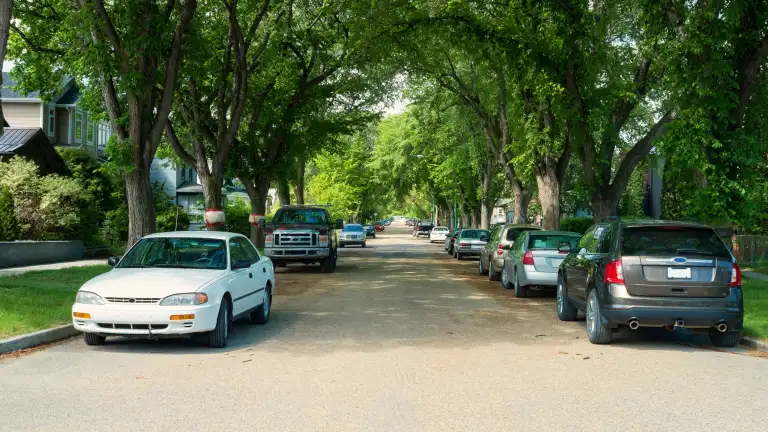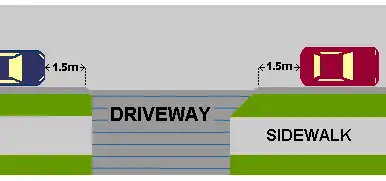
Only a resident can park on the street in front of their home, because that parking space belongs to them.
Parking can be a touchy subject, sparking disagreements between neighbours. Maybe a neighbour regularly parks in the spot right in front of your home. Or maybe they park multiple vehicles in their driveway, blocking the sidewalk. Learn how to deal with parking problems involving neighbours.
What you should know
“When my neighbour got home from work, she used to park directly in front of my home. I’m 76 and have some mobility issues. When I was lucky enough to get a spot out front, I’d stay home because I was afraid to move the car. It just all got to be too much, so I brought it up one day with my neighbour. At first, she said she could park wherever she wanted because neither of us owns the parking space in front of our homes. Then I explained my mobility issues. She apologized and told me she’d make an effort to park elsewhere. We’ve actually become friends, and she helps me carry my groceries in."
– Caleb, Campbell River, BC

Does the parking spot on the street in front of your home belong to you and the residents of your home? It seems natural it would, and many of us do park curbside in front of our homes if space is available. Any why not? It’s convenient, especially if you have to carry a heavy load to or from your car.
But the reality is that homeowners and residents don’t own the parking space on the street in front of their homes. Public roads — which include neighbourhood streets and lanes — are generally for use by everyone. This means a neighbour, or a visitor to the neighbourhood, may be able to park in front of your home. Whether they actually can, and for how long, depends on your community’s local bylaws around parking and any signage in the area.
You may be drawn to put up a handmade “no parking” sign in front of your property. It might stop people from parking there. But the sign actually has no legal effect. Nor do cones or buckets set up to “save the space.” The space isn’t yours to save.
To figure out what your rights are and what course of action you can take, you need to check your local parking bylaws. Next, we walk you through how to do this.
Many communities in BC set restrictions on the time of day, usage, and location of street parking. In Vancouver and Burnaby, for example, local bylaws prevent parking of more than three hours between 8 am and 6 pm in front of any home or business you don’t own or work for. (Vancouver's bylaw has some exceptions.) The city will enforce this three-hour bylaw on request of a homeowner or tenant. If a vehicle is parked in front of two properties, both homeowners may need to call the city for bylaw enforcement.
In other municipalities, such as North Vancouver and Surrey, street parking is available on a first-come, first-served basis. This means anyone can legally park on a residential street unless there are signs posted otherwise. (However, an insured and operational vehicle can’t stay parked in the same location on a public street for more than 72 hours. In Kelowna, it’s 24 hours.)
Because one community’s parking laws can differ from another, look for street signs and check the local bylaws when it comes to parking on public streets. See if any apply to your situation and whether you can get help with enforcement if needed. Violators can be fined, and sometimes their vehicles can be towed. It can be a bit tricky, though, as sometimes there are parking signs about the rules and sometimes there aren’t.
For information on the street parking laws in your community, call 3-1-1. You can also contact your local municipality directly, or check their website.
Find local bylaws dealing with parking
On the website CivicInfo BC, you can search across local government websites province-wide to find local bylaws relating to parking in your community. In the search box, type in parking bylaw and the name of your community. For example, to find parking bylaws for Coquitlam, you could type parking bylaw coquitlam.

Most, if not all, communities have parking restrictions. You’ve probably seen signs for two-hour parking maximums or no parking in front of a school during school hours. Other signs may prevent parking at certain times for scheduled street cleaning or snow removal, or may shorten parking times in busy shopping areas.
To help balance the parking needs of both residents and visitors in high-demand areas, many communities post street signs indicating that parking on certain streets is:
restricted to resident parking with time-limited spaces for visitors, or
for residents of a certain block only, 24 hours everyday.
If you live in an area like this, you have to buy a residential parking permit. But having a permit may not guarantee you’ll have a parking spot in front of your property. (Or, in some cases, your block.) Ultimately, other neighbours in the area with a parking permit can park in front of your home.
It’s a different story for out-of-neighbourhood visitors. These cars can be ticketed or towed if a resident reports them to the municipality.
In many neighbourhoods, there may be parking bylaws in effect even when there is no signage. The local bylaws may set out who can park on a particular street, where along the street they can park, and for how long.
Some communities restrict non-resident parking in a residential area to a maximum number of hours. (In Burnaby and Vancouver, among others, it’s three hours max between 8 am and 6 pm.) This is to allow daytime access for residents to their homes, and for business owners and employees to their workplaces. But there are often exemptions for emergency vehicles and, increasingly, car share vehicles.
Other local bylaws set out parking distances from fire hydrants, sidewalks, private roads, and driveways. For example, the city of Vancouver’s parking bylaw says:
Do not stop or park within 1.5 m of a private road, boulevard crossing, or sidewalk crossing.

(Image from the city of Vancouver.)
Even if there are no street parking signs, there may be other markings on the road. For example, yellow painted curbs generally mean “no parking.”
A vehicle may be parked in front of your home for several hours. Or it may be blocking or partially blocking your driveway or the sidewalk. In those cases, whether you report it to your municipality may depend not only on what the laws say, but also who owns the vehicle. (Is it a stranger or someone you know?)
What happens when there’s a vehicle you don’t recognize that’s been parked in front of your home …. for weeks? It may be violating street parking signs or local bylaws or both. Maybe it’s an abandoned vehicle.
The definition of an abandoned vehicle varies by community. In Vancouver, for example, a vehicle is considered abandoned if any of the following apply:
the vehicle is unlicensed
it’s uninsured
it doesn’t display valid licence plates
it’s in poor condition (for example, it’s damaged or in obvious disrepair) or is inoperable
it’s been parked for more than 14 days on a street other than the street recorded as the address of the registered owner
You can report abandoned vehicles on your street to the RCMP or your local police by calling their non-emergency line.
You can also contact your municipality and file a report by phone or online. If the municipality determines that a vehicle is abandoned, they’ll typically leave an informational sticker and violation ticket on it. If the vehicle is unlicensed or has been uninsured for more than three months, the municipality can have it towed.
Work out problems
Let’s say a parking problem has come up between you and your neighbour. Sometimes, there are simple steps you can take to fix things. For example, if you wanted to preserve access to a parking spot on the street in front of your home, you might put up a sign explaining yourself in a sentence: “This parking spot helps an elderly resident get to their home safely.”
Keep things civil. Though it might make you feel (briefly) better, a rude note on your neighbour’s windshield isn’t likely to improve the situation or your relationship with your neighbour.
You’d be surprised how often a friendly chat works. Your neighbour may not actually be aware that something they’re doing (or not doing) is causing a problem. Maybe they’re stressed out at work or just had a baby — so parking issues aren’t top of mind. It could be this is all a tempest in a teapot, and easily calmed.
That said, raising the issue directly with your neighbour can feel scary. It’s worth giving some thought in advance to what you’re going to say, and how.
Calmly describe your concern and explain how and why the issue bothers you. For example: I actually have mobility issues and need to park as close as possible. Or: I have an easy-to-steal car so I like to keep an eye on it.
Ask for your neighbour’s thoughts. Invite them to explore options that will work for both of you.
To help you prepare for the conversation, we offer tips for talking with your neighbour. We also have a template to prepare for the talk.
If talking with your neighbour doesn’t work (or isn’t a possibility) and the problem persists, gather evidence to support your complaint. You might:
Take photos or a video. For example, let’s say the neighbour regularly parks their vehicle on the street directly in front of your home during the day. Snap time- and date-stamped photos of the vehicle.
Make notes. Log the date and time of each occurrence of what’s concerning you. Describe the impact on you and your ability to enjoy your home and neighbourhood.
Seek backup. For example, let’s say a neighbour is regularly blocking the sidewalk with vehicles spilling out of their driveway. Invite another neighbour to describe how this behaviour also negatively affects them.
Do research. Check your local parking bylaws, strata bylaws, or other related laws.
Stay organized. Keep all your evidence in one place, like a file folder or on your phone or computer.
Once you’ve gathered evidence to support your complaint, write a letter to your neighbour setting out your concerns. Let’s say their parked car regularly sticks out into your driveway and you’re worried about hitting it. In the letter, you could:
1. Explain your specific concerns and the impact on you
"There’s very limited visibility from my driveway, making me feel very unsafe when I back out."
2. Provide evidence of the problem
"Here's a photo I took of the view as I backed up, showing my visibility problems. And here's a copy of the local bylaw showing that you're parking too close to the edge of my driveway."
3. Suggest ways the situation might be resolved
"Perhaps you could park just another 20 feet up or down the street so everyone can be safe."
4. Describe what will happen if they outright refuse
"I'd rather not have to, but I'm prepared to contact the local parking enforcement authorities about the bylaw violation."
We have a short template letter to help get you started. The letter can be adapted to your situation.
If you’re unable to resolve the matter directly with your neighbour, consider mediation. This involves the two of you meeting with a neutral third party (a mediator). They’ll work to help you reach an agreement. Mediation is often quicker and less expensive than legal action. And it can help preserve a good neighbourly relationship.
Finding a mediator
You can search for a mediator based on the city or town you live in and the type of problem you have. On the ADR Institute website or the Mediate BC website, select community in the area of expertise or practice.
If the problem with your neighbour continues, consider contacting your municipality. If there’s a local bylaw around parking that’s being broken, you can file a complaint or ask the municipality to take action.
For example, if non-residents park on the street where you live, you could ask your municipality to increase their enforcement efforts (if parking restrictions are in place) or create a new residential permit parking zone.
To file a complaint with your local municipality, call 3-1-1. Or contact your municipality directly. Generally, when making a complaint, you must provide your contact information, but it is kept confidential.
If none of the steps above have resolved the problem, it may be time to consider legal action. If you’ve told your neighbour about the problem but it continues to interfere with your use and enjoyment of your property, you can start a nuisance action.
But don’t take this option lightly. Legal action can be a long, expensive, and stressful process. There’s no guarantee you’ll win: a court or tribunal may decide there isn’t enough evidence of a nuisance. And taking legal action against a neighbour will almost certainly strain your relationship — no small matter since you’re living next to one another.
If you decide to press forward, here's a primer on bringing a lawsuit. If your claim is for less than $5,000, you can bring it to the Civil Resolution Tribunal. This online system encourages a collaborative approach to resolving disputes.
If you prove your claim, you’ll usually get an order for compensation. The neighbour can also be ordered to stop the offending behaviour.
Common questions
Municipalities create new residential permit parking zones when there’s high demand for neighbourhood street parking. You can ask your municipality to create one by completing an application or a petition. Which process you use depends on the municipality you live in. It can be relatively straightforward (Vancouver, New Westminster) or somewhat more involved (North Vancouver, Kelowna). It could take at least a few months before the city reviews your request and gets back to you.
Campers and RVs are typically considered oversize or large vehicles. Sometimes they can park on your street, and sometimes they can’t: it depends on your community’s local bylaws and any street parking signs.
Large vehicles are those that meet certain criteria. (Again, it depends on the community.) For example, here are Vancouver’s criteria. A large vehicle with valid insurance can park on a residential street in Vancouver for up to three hours between 6 am to 10 pm. But it can’t park on the street overnight between 10 pm to 6 am. Sometimes a big vehicle can extend its stay with a street-use permit.
You can contact your municipality if you aren’t sure whether a large vehicle is following the local parking laws.
Let’s say it’s autumn and the chestnuts are falling from the tree over your usual parking space. They sound like bullets as they hit your car, leaving little dents. You’re concerned about your car and you feel unsafe, so you’ve started parking farther up the street for several hours at a time. One day you come out to find a ticket on your windshield: your neighbour has called the municipality on you.
If you get a parking ticket you think is unfair, there are a few things you can do. You can start off by contacting your municipality to discuss your concerns. If that doesn't resolve the problem, you'll need to dispute your ticket by following the directions on the ticket. Take note of the time limit for disputing a ticket (you usually have to do so within 14 days). Many municipalities have an adjudication system, and your municipality's website may describe how to apply to dispute the ticket.
To file a complaint with your local municipality, call 3-1-1. Or you can contact your municipality directly. Many have complaint forms on their website. Generally, when you make a complaint, you must provide your contact information, but it’s kept confidential.
Who can help

Access Pro Bono's Free Legal Advice
Volunteer lawyers provide 30 minutes of free legal advice to people with low or modest income.

Access Pro Bono’s Everyone Legal Clinic
Clinicians provide affordable fixed-fee services on a range of everyday legal problems.

Lawyer Referral Service
Helps you connect with a lawyer for a complimentary 15-minute consult to see if you want to hire them.

BC Legal Directory
Search for a lawyer by community or legal issue. From the Canadian Bar Association, BC Branch.

ADR Institute of BC
Maintains a roster of qualified mediators and arbitrators who help with dispute resolution.

Mediate BC
How mediation in BC works, and a roster of mediators.

